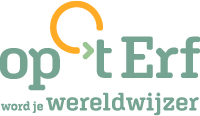For parents
We raise
children together
Parent(s) and caregiver(s)
are more than just lice-picking taxi drivers!
Yes of course, this support is also more than welcome, but we primarily view parent(s)/guardian(s) as active partners in their child(ren)'s learning process. This means we collaborate with parent(s)/guardian(s) to make learning and development meaningful and personalized. Parents contribute their ideas, contribute their own knowledge and experience, and are involved in (school) activities and (learning) goals.
Good to know
Op 't Erf is a children's centre for childcare and education. We are open 52 weeks a year from 7:30 to 18:30 for children aged 0 to 13. School hours are Monday through Friday from 8:30 to 14:15.
- Roos en Tulp (the daycare centre) is open 52 weeks from 7:30 to 18:30
- The after-school care center is open on school days from 7:30 to 8:30 and from 14:15 to 18:30. On school study days, the after-school care center is open from 7:30 to 18:30, and on school study afternoons, it is open from 12:00 to 18:30.
- Peuterwerk (nursery) is open 40 weeks a year from 8:30 to 12:30 on Mondays, Tuesdays, Wednesdays and Fridays.
- Teaching hours are Monday to Friday from 8:30 to 14:15.
Op 't Erf closed
On Christmas Day, Boxing Day, New Year’s Day, Easter Monday, Liberation Day, Ascension Day and Whit Monday, the entire children's centre is closed.
Holidays and study days for education
- Monday, August 18, 1st day of classes in the 2025-2026 school year
- Friday October 3rd Study Day
- Friday October 10th, children are free from 12:00 due to the start of the autumn holidays.
- Monday October 13th to Friday October 17th autumn holidays
- Monday December 8th Study Day
- Friday December 19th children are free from 12:00 due to the start of the Christmas holidays
- Monday December 22nd to Friday January 2nd Christmas holidays
- Thursday January 29th Study Day
- Friday February 13th, children are free from 12:00 due to the start of the spring holidays
- Monday February 16th to Friday February 20th spring holidays
- Monday April 6th Easter Monday
- Tuesday April 7th Study Day
- Friday April 17th, children are free from 12:00 due to the start of the May holidays
- Monday April 20th to Friday May 1st May holidays
- Monday May 4th Study Day
- Tuesday May 5th Liberation Day
- Thursday May 14th Ascension Day
- Friday May 15th free day after Ascension Day
- Monday May 25th Whit Monday
- Wednesday June 17th Study afternoon
- Friday July 10th, children are free from 12:00 due to the start of the summer holidays
- Monday July 13th to Friday August 21st summer holidays
Reporting a child’s illness
If your child is unwell, please inform us via Klasbord before 8:30 for children attending school.
Request leave for education
Under certain circumstances, you can request leave for your child. We use a form for this, which you can find on the website or pick up from the professional or administration. Please submit the completed form to one of the professionals in the group or to the principal. The principal will assess whether the leave can be granted under the Compulsory Education Act. If your child has a visit to the doctor, dentist, or similar appointment, you can inform the professional in the group. A leave form is not required for this.
At Op ’t Erf we work with a participation body in which both childcare and education are represented.
Every school is legally required to establish a participation council (MR). The MR consists of professionals from the children's centre and parent(s)/guardian(s), and discusses and establishes school policy.
Every childcare facility is legally obliged to establish a parent committee (OC), in which parents have a say in the policy of that childcare facility.
Because Op 't Erf is a children's centre where both childcare and education are represented, we have chosen to merge the MR and OC into a single participation body, the Children's Centre Council (KC Council).
The KC Council comprises both parent(s)/guardian(s) and professionals from childcare and education. The KC Council's duties and powers are laid down in its regulations and statutes. The KC Council discusses everything related to our children's centre. Important decisions and policies are submitted to the KC Council. The KC Council has the right to approve certain matters (for example, the children's centre plan and the children's centre guide) and the right to advise on others (for example, future plans). The KC Council may also make unsolicited proposals or provide advice.
The KC Council consists of:
- Ingrid Jansen
- Linda Evers
- Marieke Kuipers
- Bas Hoekstra
We have a parent council to organize celebrations, sports days, arrange photography, decorate the building, and so on. The council consists of a number of involved parents who, together with a professional from Op 't Erf, organize activities, such as the Sinterklaas celebration. The council meets several times a year. In addition, the involved parties hold separate meetings for the organization of a specific activity.
Parent(s)/guardian(s) are our most important partners, alongside our children and professionals. We highly value parental involvement and believe that strong collaboration between the children's centre and home contributes to a rich (learning) environment for every child.
When registering a child, we ask their parent(s)/guardian(s) to complete a form detailing their hobbies, talents, and profession. This information is carefully stored in our parent database.
We learn and develop through the world around us and regularly invite parent(s)/guardian(s) to contribute to projects, themes, or other activities where their knowledge or experience can be valuable. In this way, we leverage the strengths and diversity within our children's centre and, together, create an inspiring (learning) environment.
In deep learning and developing, establishing learning partnerships is central. By learning partnerships, we mean equal relationships in which both parties actively contribute to the development process of a child or the children's centre.
Key features of these learning partnerships are:
- Reciprocity: partners learn from and with each other, play an active role in the development process, and are open to feedback.
- Ownership: partners take responsibility for their part in the development process.
- Trust and safety: there is a culture in which mistakes are allowed and in which the process is more important than the result.
- Creating meaning together: partners explore the subject matter together, connect with the child’s learning world, and look for relevance in what is being learned.
This approach requires a different way of interacting with each other, with an emphasis on co-creation, dialogue and deep involvement.
We have the most intensive learning partnerships with the children at Op 't Erf, their parent(s)/guardian(s), and our professionals. We also form learning partnerships with people in the neighborhood, businesses in the municipality of Best, and other partners in the Netherlands and around the world.
Partnerships we would like to mention here are:
The first child centre with its own Parent's centre
Because we consider parents and caregivers important learning partners, we have a dedicated 'living room' just for them. Here you can enjoy a nice cup of coffee or tea, read the newspaper, chat with other parents, or even open your laptop to get some work done.
@opterf
Jaren geleden begon dit duo samen als directeur. Een serieuze taak, maar met ook heel veel lol!🙃De klik die er was is nooit meer weggegaan. Daarom vieren ze vandaag nog een keer samen de Dag van de directeur en zijn daarom een dagje off line. Met dank aan alle collega`s! #dagvandedirecteur #vriendschap #offline @kcdezevensprongbest @opterfbest ...
U bent van harte welkom bij Op `t Erf om te komen stemmen! ...
Kom jij Op ’t Erf?!
Wil jij werken op een fijne plek waar 0 tot 13-jarigen zich kunnen ontwikkelen tot ‘wereldwijzers’. Op een echt Kindcentrum waar opvang en onderwijs naadloos in elkaar overgaan? We zoeken een enthousiaste leerkracht voor onze unit 1/2/3. En wil je meer; dat kan! We zoeken namelijk ook een bouwcoördinator voor unit 1/2/3. Bekijk snel de volledige vacature op onze website of neem rechtstreeks contact op met Marieke Snoeks.
...
Ben of ken jij de pedagogisch professional, die samen met een enthousiast team wil werken op een spiksplinternieuw, groen en duurzaam kindcentrum? Scan de QR-code voor meer informatie. ...
Wij wensen jullie een fijne zomervakantie!☀️ ...
Morgen is het zover! Wees welkom op ‘t Erf! ...


